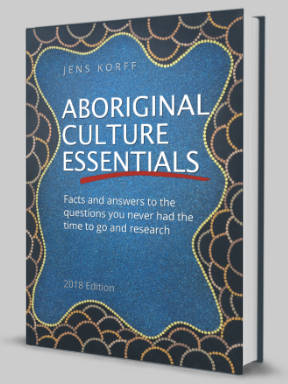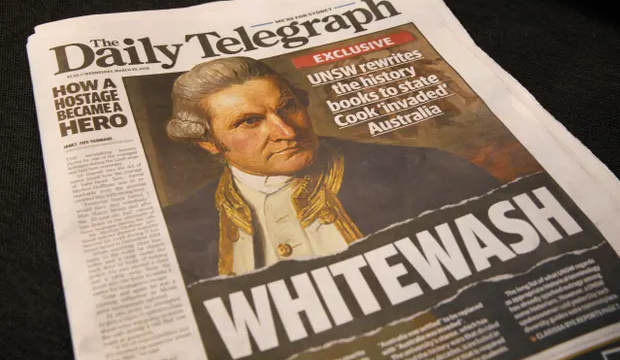History
Settlement or invasion?
Was Australia colonised or invaded? It's a discussion that polarises many. Can you see it with Aboriginal eyes?

Wishing you knew more about Aboriginal culture? Search no more.
Get key foundational knowledge about Aboriginal culture in a fun and engaging way.
This is no ordinary resource: It includes a fictional story, quizzes, crosswords and even a treasure hunt.
Stop feeling bad about not knowing. Make it fun to know better.
You might not know the word Cook used
Aboriginal and non-Aboriginal people have different views whether Australia was 'invaded', 'settled', 'occupied', 'discovered' or 'colonised'.
If you grew up being told that Australia was largely peacefully colonised or settled it is understandable that changing this to 'invaded' feels uncomfortable at best and revolting at worst.
But did you know the word Captain James Cook used in his own journal? In 1774 he wrote: [1]
We enter their ports without their daring to make opposition, we attempt to land in a peaceable manner, if this succeeds it's well, if not we land nevertheless and maintain the footing we thus got by the superiority of our fire arms, in what other light can they then at first look upon us but as invaders of their country?
Note also how Cook has no issue with changing the initial "peaceable" approach to one using the "superiority of fire arms". If he doesn't get what he wants he takes it by force.
Remember also that Australia's history is littered with reports of massacres on Aboriginal people, and that there were frontier wars which claimed the lives of tens of thousands of Aboriginal people. These events seem to be incompatible with settlement, a term usually associated with peaceful undertaking.
The government of the day defines the term
Australian governments in the 1990s amended curriculum documents based on their preferred term. Labor described colonisation as a "European invasion" while conservative documents labelled it a "British settlement". [2] The National Museum of Australia and the Australian War Memorial have also fought over which term is appropriate.
While most Australians proudly commemorate the history of the Anzacs or Australia's contribution to the World Wars, they are very reluctant to acknowledge the British invasion of Australia. [3]
But this view is slowly changing.
We must now assert in the strongest possible way the message that Australia was indeed invaded by a military force under the control of the British Admiralty.
— Michael Ghillar Anderson, Aboriginal elder [4]
Pioneers change 'settlement' to 'invasion'
In 2011 the City of Sydney officially declared the settlement of Australia an invasion. The word was to be included in the Aboriginal statement for the council's 10 year corporate plan. But a poll of more than 2,000 readers of the Daily Telegraph found that less than 15% agreed with the council's decision. More than 85% rejected it. [5]
In March 2016 the University of New South Wales rewrote the guidelines in their Diversity Toolkit. The new guidelines liberally use the term 'invasion' and recommend using "Indigenous (Australian) history, Pre-invasion history, Invasion history" or "Post-invasion history" when referring to Australian history. It goes on to say that "Australia was not settled peacefully, it was invaded, occupied and colonised. Describing the arrival of the Europeans as a 'settlement' attempts to view Australian history from the shores of England rather than the shores of Australia." [6]
The changes led to some passionate debate, especially after the Daily Telegraph ran an outraged front page slamming the guide as a 'whitewashing' and rewriting of Australia's history. Conservative commentators, such as radio host Alan Jones, dismissed the guidelines. "I think this is exactly what John Howard was talking about when he talked about the black armband view of history," Mr Jones said. [7]
But there was also powerful support. Queensland Premier Annastacia Palaszczuk admitted that "for many years, Australian schools and Australian institutions have not told the truth about the way in which Australia was settled. A lot of Indigenous people lost their lives—there were massacres and the truth always must be told." [8]
In respect to the Aboriginal community, ["invasion"] is something that is very important and needs to be used.
— Lord Mayor Clover Moore, Sydney [5]

Australia was not settled by the common law but by the rules and disciplines of war.
— Wadjularbinna Nullyarimma, Gungalidda Elder [9]
Homework: Switch sides
Imagine you are a young Aboriginal fella witnessing the landing of Captain Cook's party.
How would you report back this event to your family?
- Read up on what happened when Captain Cook first landed and interacted with Aboriginal people.
- With this background, write an entry in an 'Aboriginal journal' of that time. Consider carefully the words you use and check if your family would agree with them.
The settlement of the British was not peaceful, and is increasingly accepted as being a countrywide invasion.
— Information leaflet, NSW Department of Indigenous Affairs [10]
We were invaded. It is the truth and shouldn't be watered down.
— Paul Morris, head of the Metropolitan Local Aboriginal Land Council, Sydney [5]
While we restore old monuments and construct new ones to commemorate military conflict overseas, there are still no official memorials to those who died on the frontier [of Australia's Aboriginal wars].
— Henry Reynolds, Marilyn Lake [3]